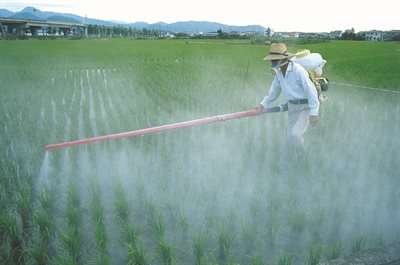Towards pesticidovigilance

A fascinating insight paper, "Towards pesticidovigilance" published in Science today by Dr Alice Milner, Lecturer in Physical Geography at Royal Holloway and Professor Ian Boyd (School of Biology, University of St Andrews), looks at global pesticide regulation and the lessons to be learned from the regulation and monitoring of pharmaceuticals which could improve environmental sustainability and lead to better risk-based decisions for pesticide safety.
Pesticides are important for global food production, and stringent regulation is in place to prevent harm to non-target organisms and the environment. However, public mistrust in pesticide regulation is increasing as evidence for unintended effects of pesticides increases, such as recent concerns of neonicotinoids effects on pollinators. Regulators are withdrawing certain pesticides from use to prevent widespread negative effects on non-target organisms, but abrupt withdrawal can lead to the use of alternatives that can be just as problematic, rather than giving time for agricultural systems to adjust. Milner and Boyd suggest that pesticide regulation needs to account for landscape-scale effects and that lessons from pharmaceutical monitoring should be applied to pesticides as a global standard.
The research finds there are many parallels between how we regulate pesticides and pharmaceuticals and society depends on pesticides in a similar way to how it relies on antibiotics. Both are manufactured and supplied to market demand, both are often use prophylactically or as therapies of first resort, and both are vulnerable to loss of efficacy through resistance in target organisms. A similar process of substance discovery and early testing occurs for both pharmaceuticals and pesticides, and both industries require extensive dossiers on safety and efficacy before a product can be used. The main difference occurs after pesticides and pharmaceuticals are licensed for use. Pharmaceuticals undergo long-term collection, detection, monitoring and prevention of adverse effects throughout the lifetime of a product – termed pharmacovigilance. There is no equivalent for pesticides – the effects of dosing landscapes with pesticides that have been approved for use are not monitored and largely unknown. Milner and Boyd suggest that this should be changed.
Better risk-based decisions for pesticide safety
Milner and Boyd propose that an equivalent to pharmacovigilance is introduced for pesticides – 'pesticidovigilance." Data on the effects of pesticides can be collected by manufactures and growers using pre-registered designs, providing information on effects of long-term and widespread use of pesticides. Doing so will lead to better risk-based decisions for pesticide safety, increase trust in regulation, and help sustain the use of important chemical technologies.
The research paper has been covered in The Guardian newspaper today. Dr Milner told the Guardian: "We want to start a discussion about how we can introduce a global monitoring programme for pesticides, similar to pharmaceuticals. It can take years to fully understand the environmental impact."
"Any chemical you put into the environment has the potential to be widely distributed," she said.. There are often quite unexpected effects [and] you often don't see them until the pesticide is used at more industrial scales."
More information: Alice M. Milner et al. Toward pesticidovigilance, Science (2017). DOI: 10.1126/science.aan2683
Journal information: Science
Provided by Royal Holloway, University of London
















